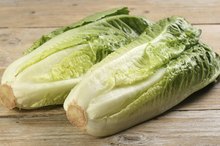What does fact checked mean?
At Healthfully, we strive to deliver objective content that is accurate and up-to-date. Our team periodically reviews articles in order to ensure content quality. The sources cited below consist of evidence from peer-reviewed journals, prominent medical organizations, academic associations, and government data.
The information contained on this site is for informational purposes only, and should not be used as a substitute for the advice of a professional health care provider. Please check with the appropriate physician regarding health questions and concerns. Although we strive to deliver accurate and up-to-date information, no guarantee to that effect is made.
Can I Have Spinach While Breastfeeding?
Spinach is well known as a versatile, nutritious vegetable, equally good cooked or served raw in salads. Like other leafy greens, it is high in iron, vitamins and minerals, and provides a useful quantity of dietary fiber. However, pregnant and breastfeeding women have different dietary requirements, and it's worth taking a closer look at spinach in conjunction with nursing.
About Spinach
Like Swiss chard, spinach is a member of the beet family. It was first domesticated in Central Asia, where the Persians discovered it and introduced it to the western world. There are many varieties of spinach grown around the world. Some produce thick leaves best suited for cooking, while others have thin, delicate leaves that are perfect for salads, especially when picked young. While most leafy greens are strongly flavored, like collards or kale, spinach is mild enough to adapt itself to almost any dish.
- Like Swiss chard, spinach is a member of the beet family.
- While most leafy greens are strongly flavored, like collards or kale, spinach is mild enough to adapt itself to almost any dish.
Spinach and Nutrition
Raw Spinach and Kidney Damage
Learn More
Leafy greens in general are healthful and nutritious, and spinach is no exception. It is the leading dietary source of folate; in fact, folate was first isolated from spinach. Folate is found to prevent various birth defects, as well as reduce your risk of premature birth, according to the National Institutes of Health Office of Dietary Supplements 3. The recommended daily intake of folate, for a pregnant woman, is 600 micrograms, and a 1/2-cup serving of spinach contains 131 micrograms. Spinach is also high in iron, calcium, magnesium, phosphorus, potassium, niacin and several other vitamins and minerals. Most of these nutrients are important for nursing mothers and their children, so there are clear benefits to eating spinach.
- Leafy greens in general are healthful and nutritious, and spinach is no exception.
- Folate is found to prevent various birth defects, as well as reduce your risk of premature birth, according to the National Institutes of Health Office of Dietary Supplements 3.
Concerns
However, there are a few things to beware of if you eat spinach while you're nursing. Uncooked baby spinach, often eaten in salads, is periodically recalled because of contamination by salmonella, listeria, E. coli or other pathogens. These bacteria can make a healthy person inconveniently ill, but they are life-threatening to infants. Uncooked spinach also has "anti-nutrient" characteristics. The oxalic acid, phytic acid and polyphenols in raw spinach bind to nutrients such as iron and calcium, preventing their absorption by the body. Both iron and calcium are especially important nutrients for nursing mothers.
- However, there are a few things to beware of if you eat spinach while you're nursing.
- These bacteria can make a healthy person inconveniently ill, but they are life-threatening to infants.
Recommendations
Nutritional Value of Mesclun Greens vs. Romaine Lettuce
Learn More
Green leafy vegetables including spinach are a healthful, highly nutritious part of a balanced diet. If you're nursing, you should be eating them regularly. However, it's best to cook your spinach, rather than eating it raw in salads or sandwiches, because of the risk of food-borne illness. Blanching your spinach in boiling water before cooking it will kill any pathogens that may be present, and it also breaks down the anti-nutrient components in spinach that would otherwise impair your ability to absorb iron and calcium.
- Green leafy vegetables including spinach are a healthful, highly nutritious part of a balanced diet.
- Blanching your spinach in boiling water before cooking it will kill any pathogens that may be present, and it also breaks down the anti-nutrient components in spinach that would otherwise impair your ability to absorb iron and calcium.
Related Articles
References
- On Food and Cooking: The Science and Lore of the Kitchen; Harold S. McGee
- USA Today: Spinach Recall: 5 Faces. 5 Agonizing Deaths. 1 Year Later
- National Institutes of Health Office of Dietary Supplements: Folate
- Spinach. FoodData Central. U.S. Department of Agriculture. Updated December 6, 2019.
- Vitamin A fact sheet for health professionals. National Institutes of Health. Office of Dietary Supplements. Updated 2020.
- Nour M, Lutze SA, Grech A, Allman-Farinelli M. The relationship between vegetable intake and weight outcomes: A systematic review of cohort studies. Nutrients. 2018;10(11). doi:10.3390/nu10111626
- Vaňková K, Marková I, Jašprová J, et al. Chlorophyll-mediated changes in the redox status of pancreatic cancer cells are associated with its anticancer effects. Oxid Med Cell Longev. 2018;2018:4069167. doi:10.1155/2018/4069167
- Park SY, Na SY, Kim JH, Cho S, Lee JH. Iron plays a certain role in patterned hair loss. J Korean Med Sci. 2013;28(6):934-8. doi: 10.3346/jkms.2013.28.6.934
- Iron fact sheet for health professionals. National Institutes of Health. Office of Dietary Supplements. Updated 2019.
- Vitamin K fact sheet for health professionals. National Institutes of Health. Office of Dietary Supplements. Updated 2020.
- Food allergy overview. American Academy of Allergy, Asthma & Immunology. Updated 2020.
- Park JN, Lee JS, Noh MY, Sung MK. Association between usual vitamin K intake and anticoagulation in patients under warfarin therapy. Clin Nutr Res. 2015;4(4):235-41. doi:10.7762/cnr.2015.4.4.235
- Pendick D. 5 steps for preventing kidney stones. Harvard Health Publishing. Harvard Medical School. Updated 2013.
- Spinach. University of Illinois Extension. Watch Your Garden Grow. Updated 2020.
- Colorado spinach. Colorado Farm to Table. Colorado State University Extension. Updated 2017.
- Vegetable blanching directions and times for home freezer storage. The University of Minnesota Extension. Updated 2018.
Writer Bio
Fred Decker is a trained chef and certified food-safety trainer. Decker wrote for the Saint John, New Brunswick Telegraph-Journal, and has been published in Canada's Hospitality and Foodservice magazine. He's held positions selling computers, insurance and mutual funds, and was educated at Memorial University of Newfoundland and the Northern Alberta Institute of Technology.









